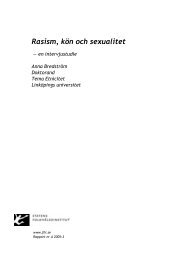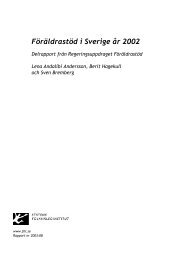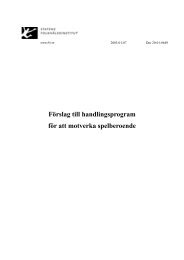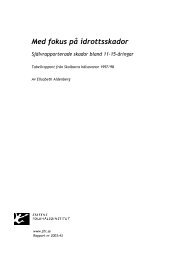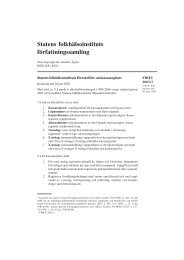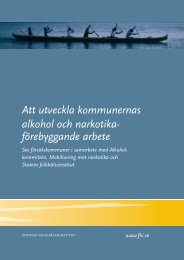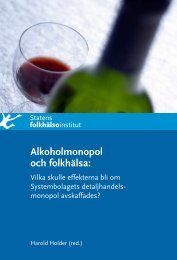Gambling motivation and involvement: A review of social
Gambling motivation and involvement: A review of social
Gambling motivation and involvement: A review of social
You also want an ePaper? Increase the reach of your titles
YUMPU automatically turns print PDFs into web optimized ePapers that Google loves.
RELEvancE tO pRObLEm GambLinG StudiES<br />
The observation that some modes <strong>of</strong> gambling have an economic function similar<br />
to saving prompts us to reflect on possible positive aspects <strong>of</strong> gambling <strong>and</strong> to keep<br />
these in mind when judging gambling’s role in society. It is largely unknown to what<br />
extent people in contemporary Western societies gamble because it is an alternative<br />
to saving, making it possible for them to buy, once in a while, relatively expensive<br />
goods, that their household budget does not allow for. Qualitative studies could<br />
indicate if there is such an economic function <strong>of</strong> some modes <strong>of</strong> gambling. Survey<br />
studies, including relevant questions on income <strong>and</strong> spending patterns, could show<br />
whether this possible function has any notable influence on gambling <strong>involvement</strong><br />
<strong>and</strong> problem gambling.<br />
The process utility <strong>of</strong> gambling<br />
Currently, the “strong” <strong>and</strong> original version <strong>of</strong> the Friedman-Savage hypothesis or<br />
the various theoretical developments <strong>of</strong> expected utility theory are seldom applied to<br />
gambling, a rare example being a paper by Nyman [154]. The reason for this ought<br />
to be that gambling as an economic activity cannot be explained to any greater<br />
extent solely by the socio-economic <strong>motivation</strong> originally assumed by Friedman<br />
<strong>and</strong> Savage. The “weak” <strong>and</strong> broader version <strong>of</strong> the hypothesis still has an intuitive<br />
appeal, since it explains gambling as motivated by a wish for lifestyle improvement<br />
in general. However, even this is seen by many economists as too limited an explanation<br />
for people’s propensity to gamble.<br />
Today, most economists with an interest in gambling acknowledge what their<br />
earlier colleagues – for reasons <strong>of</strong> theoretical purity <strong>and</strong> orthodoxy – refrained from<br />
including in their theories: that gambling has a utility value in itself [155–158]. People<br />
gamble not only because they hope they can make money from it, but also – <strong>and</strong><br />
perhaps primarily – because the activity <strong>of</strong> gambling in itself is fun, exciting, stimulating<br />
<strong>and</strong> interesting, <strong>and</strong> brings with it many other things that people appreciate.<br />
In order to enjoy these things, people are prepared to pay, <strong>and</strong> they do so accepting<br />
that in the long run participation in commercial gambling will almost certainly lead<br />
to economic losses. The orthodox economic theory <strong>of</strong> gambling focused on the<br />
expected consequences, in monetary terms, <strong>of</strong> participating in gambling; modern<br />
economists prefer to focus on the process utility <strong>of</strong> gambling [156].<br />
A theoretical economic model has shown that even a tiny utility <strong>of</strong> gambling,<br />
appended to an expected utility model, adequately explains why people engage in<br />
various forms <strong>of</strong> gambling [146]. Furthermore, acknowledging the process utility <strong>of</strong><br />
gambling makes it easier to underst<strong>and</strong> the economic aspect <strong>of</strong> gambling behavior,<br />
such as the determinants <strong>of</strong> lottery ticket sales [53] <strong>and</strong> patterns <strong>of</strong> betting on horse<br />
races [159] or baseball games [160]. The assumption <strong>of</strong> process utility underlies<br />
30 G A M B L I N G M O T I VAT I O N A N D I N V O LV E M E N T




